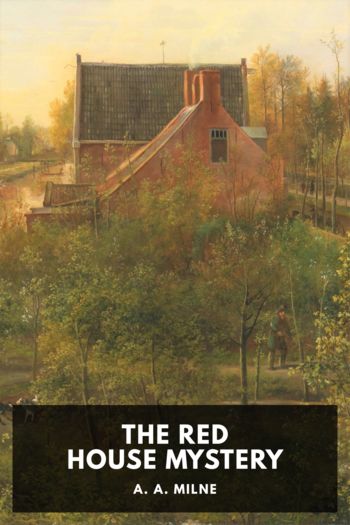Short Fiction - Edgar Allan Poe (book reader for pc .TXT) 📗

- Author: Edgar Allan Poe
Book online «Short Fiction - Edgar Allan Poe (book reader for pc .TXT) 📗». Author Edgar Allan Poe
At an angle of the ponderous wall frowned a more ponderous gate. It was riveted and studded with iron bolts, and surmounted with jagged iron spikes. What impressions of deep awe did it inspire! It was never opened save for the three periodical egressions and ingressions already mentioned; then, in every creak of its mighty hinges, we found a plenitude of mystery—a world of matter for solemn remark, or for more solemn meditation.
The extensive enclosure was irregular in form, having many capacious recesses. Of these, three or four of the largest constituted the playground. It was level, and covered with fine hard gravel. I well remember it had no trees, nor benches, nor anything similar within it. Of course it was in the rear of the house. In front lay a small parterre, planted with box and other shrubs, but through this sacred division we passed only upon rare occasions indeed—such as a first advent to school or final departure thence, or perhaps, when a parent or friend having called for us, we joyfully took our way home for the Christmas or Midsummer holidays.
But the house!—how quaint an old building was this!—to me how veritably a palace of enchantment! There was really no end to its windings—to its incomprehensible subdivisions. It was difficult, at any given time, to say with certainty upon which of its two stories one happened to be. From each room to every other there were sure to be found three or four steps either in ascent or descent. Then the lateral branches were innumerable—inconceivable—and so returning in upon themselves, that our most exact ideas in regard to the whole mansion were not very far different from those with which we pondered upon infinity. During the five years of my residence here, I was never able to ascertain with precision, in what remote locality lay the little sleeping apartment assigned to myself and some eighteen or twenty other scholars.
The schoolroom was the largest in the house—I could not help thinking, in the world. It was very long, narrow, and dismally low, with pointed Gothic windows and a ceiling of oak. In a remote and terror-inspiring angle was a square enclosure of eight or ten feet, comprising the sanctum, “during hours,” of our principal, the Reverend Dr. Bransby. It was a solid structure, with massy door, sooner than open which in the absence of the “Dominie,” we would all have willingly perished by the peine forte et dure. In other angles were two other similar boxes, far less reverenced, indeed, but still greatly matters of awe. One of these was the pulpit of the “classical” usher, one of the “English and mathematical.” Interspersed about the room, crossing and recrossing in endless irregularity, were innumerable benches and desks, black, ancient, and timeworn, piled desperately with much-bethumbed books, and so beseamed with initial letters, names at full length, grotesque figures, and other multiplied efforts of the knife, as to have entirely lost what little of original form might have been their portion in days long departed. A huge bucket with water stood at one extremity of the room, and a clock of stupendous dimensions at the other.
Encompassed by the massy walls of this venerable academy, I passed, yet not in tedium or disgust, the years of the third lustrum of my life. The teeming brain of childhood requires no external world of incident to occupy or amuse it; and the apparently dismal monotony of a school was replete with more intense excitement than my riper youth has derived from luxury, or my full manhood from crime. Yet I must believe that my first mental development had in it much of the uncommon—even much of the outré. Upon mankind at large the events of very early existence rarely leave in mature age any definite impression. All is gray shadow—a weak and irregular remembrance—an indistinct regathering of feeble pleasures and phantasmagoric pains. With me this is not so. In childhood I must have felt with the energy of a man what I now find stamped upon memory in lines as vivid, as deep, and as durable as the exergues of the Carthaginian medals.
Yet in fact—in the fact of the world’s view—how little was there to remember! The morning’s awakening, the nightly summons to bed; the connings, the recitations; the periodical half-holidays, and perambulations; the playground, with its broils, its pastimes, its intrigues;—these, by a mental sorcery long forgotten, were made to involve a wilderness of sensation, a world of rich incident, an universe of varied emotion, of excitement the most passionate and spirit-stirring. “Oh, le bon temps, que ce siècle de fer!”
In truth, the ardor, the enthusiasm, and the imperiousness of my disposition, soon rendered me a marked character among my schoolmates, and by slow, but natural gradations, gave me an ascendancy over all not greatly older than myself;—over all with a single exception. This exception was found in the person of a scholar, who, although no relation, bore the same christian and surname as myself;—a circumstance, in fact, little remarkable; for, notwithstanding a noble descent, mine was one of those everyday appellations which seem, by prescriptive right, to have been, time out of mind, the common property of the mob. In this narrative I





Comments (0)